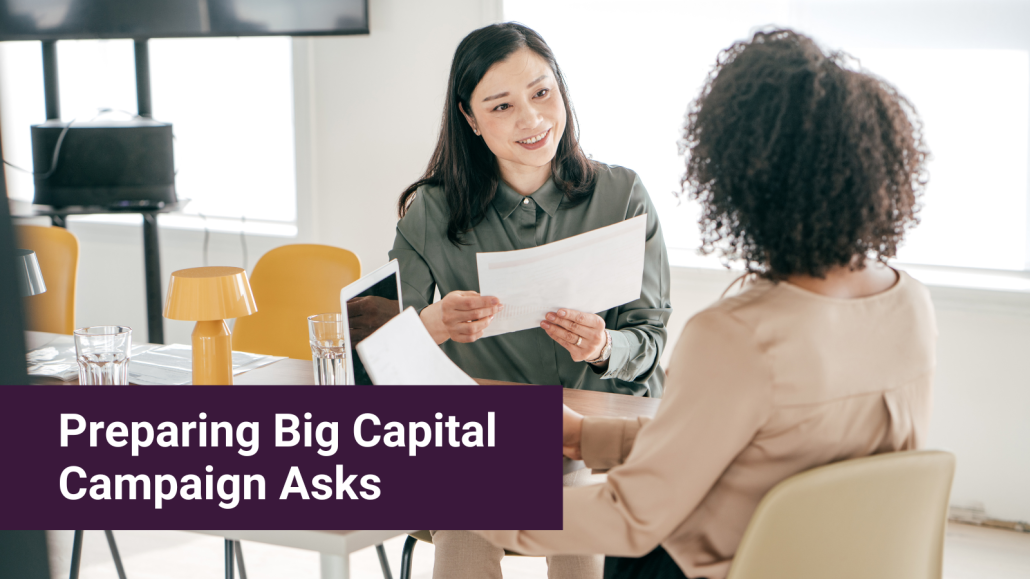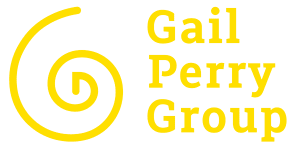Big Capital Campaign Asks: How to Reduce “Surprises” and Prepare Your Donor

“How do I know our campaign’s lead prospect is ready to be asked?” As capital campaign consultants, we frequently get that question from our clients.
Why is this a pain point for so many development teams? A lot is on the line—a lead gift is hanging in the balance. Success hinges on the donor saying yes.
What is the best way to prepare for a big “ask” in a capital campaign? How do you reduce the uncertainty and ensure your donor is ready to consider your “ask.”
It is key to lay careful groundwork with your prospects and do your homework. You should know three things before making the “big ask.”
1. The donor’s why – why do they care about your organization?
2. The donor’s potential gift level.
3. The donor’s timing.
And one more key thing – you have to have permission to make the ask.
When you know these three things and have permission, you will not likely be surprised. Your donor will be ready. The ask conversation will go smoothly.
What are some easy questions to determine their why, their potential gift level and timing to discuss a large gift?
Is Your Donor Really Ready for the Big Ask?
Here are some easy and polite ways to see if your donor is ready. These questions help you learn more about their why, potential gift level and timing:
“Would you share more about how you came to support our organization? What about our work resonates most with you?“
“We have had some great conversations lately about this project and your enthusiasm for it has been inspiring. Would you be willing to have a conversation with our CEO soon about how you could help us really impact the program?”
“I know how much the ballet means to you and your family. Would you like to have a conversation with our Board Chair about getting more involved with us as a lead donor to our campaign?”
“Your husband’s vision in founding our organization has made such an impact in our community. Would you be willing to have a conversation about ensuring that legacy continues by naming our new building or looking at some other creative ways to memorialize him?”
“Since your father set up that endowment with us 20 years ago, it has tremendously impacted area students year upon year. Could we meet soon so that I can share more about the impact of your father’s legacy and discuss some creative ways to ensure it continues to help more deserving young people?”
“Our President and I will be traveling to your area next month. Given your interest in our campaign, would now be a good time for us to discuss your possible support?”
Finally, always ask permission to discuss a gift.
Find out if the time is right for your donor.
So you know about the donor’s why and you know their potential gift level. This is where many development teams leap ahead to the “ask” without asking about the donor’s timing.
We all know that timing is everything. You do not want to make the “big ask” only to learn this is not the right time for your donor.
It needs to be the right time for your donor to discuss something big. There are many life events that may influence the timing of a gift. And don’t assume that events such as illness, loss of a loved one, or birth of child or grandchild will negatively influence a gift decision. Or that the donor selling a business or receiving an inheritance ensures a big gift for your organization.
You still have to do the work to determine when the right time is for the donor to discuss their potential gift.
And you can ask the donor directly about timing. There are several ways to frame the timing question:
- When would be a good time for us to discuss your support of our campaign?
- When the time is right for you, may we bring you a proposal?
- We have raised $xx so far and need to reach $xx to begin the next phase of completing the new senior center by end of year, which enables us to serve an additional 200 seniors. Could you see yourself helping us make this possible?
You are more likely to get a “yes” if your donor is prepared.
People need time to think about these things. These mega-gift decisions rarely happen quickly.
Remember that every donor is different and can tell you who they would like around the table (and who they would not like) when it is time to discuss a large gift.
When a donor is ready and prepared to talk about an investment, you are more able to have a substantial conversation with them.
If they are not ready to discuss it, then they simply won’t be willing to have the conversation. You’re dead in the water, too.
Often, a very large gift results from many, many discussions over a long period of time. While we may assume the “big ask” will result in a decision, it may very well just be the first in a series of conversations as the donor learns more.
Case Study: How a “Big Ask” Succeeded
Our Senior Consultant, Chuck Davis, shares his experience in preparing a donor for a seven-figure gift that ultimately was very successful.
After years of effective cultivation and the development of a genuinely friendly relationship, it was time to ask our donor for a lead gift to our campaign.
We understood why they cared about our institution. We knew their potential gift-level since we knew that the family had made several multi-million-dollar gifts to other universities, which had much larger endowments than ours.
We asked for permission to discuss their family’s commitment to the campaign. They responded with the timing and a meeting was set. To our surprise, the entire family arrived at the president’s house for this conversation.
Part of our strategy was to impress upon them that they could more easily “move the needle” at a smaller, less resourced institution like ours. Working from the assumption of their desire to make a big impact, we used this strategy to frame our ask. We also discussed a naming opportunity.
Impressed by our “moving the needle” comment, they offered a gift of less than half of the amount needed to name the building we had been discussing and less than their gifts to other institutions.
The Donor Only Committed Half of the Naming Opportunity
Was this a win? Ultimately, yes, because we learned more about the donor in the process.
Keep in mind that every conversation with a donor is an opportunity to learn more.
While the donor was well prepared for the conversation, we had lowered their sights by the suggestion that smaller gifts had a larger impact at our university; their gift offer, while generous, was simply following our lead.
We sought permission to continue the conversation regarding their support.
What was the final outcome? Thanks to the genuine relationship with the family, their initial gift of $1 million became $2.5, and a key building on campus bears their name today.
Bottom Line: Don’t let your “ask” be a surprise to your donor.
As always, it is a pleasure to share our weekly news and insights as we discuss new fundraising trends.
If your organization is planning a capital campaign or launching a major gifts program – we can help. Send an email to coaching@gailperry.com if you’d like to schedule a free strategy call with us.
Resources
A $5 Million Capital Campaign Ask that BOMBED
The Donor Teared Up. Then He Offered a Campaign Gift, Unasked
Capital Campaign Consultants: What Do They Do?

